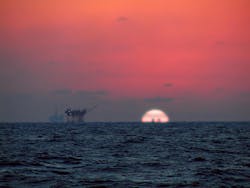API: Recent federal court decisions could imperil US GoM oil, gas operations
The American Petroleum Institute (API) on Sept. 9 said a recent federal court decision could imperil new and existing oil and natural gas exploration and production in the Gulf of Mexico.
“Without a solution in place, this decision will create a significant bureaucratic bottleneck for the federal government and potentially halt all oil and natural gas operations in the Gulf of Mexico,” API president Mike Sommers wrote to US Commerce Secretary Gina Raimondo.
The US District Court for the District of Maryland Aug. 19 found that the National Marine Fisheries Service’s (NMFS) biological opinion for oil and gas drilling in the Gulf of Mexico fails to protect the endangered Rice’s whale. The court said it would allow the biological opinion on Gulf of Mexico leasing to lapse on Dec. 20, 2024, if NMFS fails to complete a new one (OGJ Online, Aug. 21, 2024). NMFS told the court that it probably will not complete the new biological opinion until early spring 2025.
The Bureau of Ocean Energy Management (BOEM) told the court if a resolution cannot be found before the court-ordered dismissal of the biological opinion, NMFS could experience thousands of individual consultation requests for daily Gulf activities.
“The new workload created by the individual consultations for all Gulf activity would be enormous, diverting valuable agency time to a virtually endless cycle of paperwork and hindering NMFS’ ability to finalize a new” biological opinion, Sommers said.
US Gulf of Mexico production accounts for 15% of total US crude oil production, or nearly 2 million b/d, and 2% of total US natural gas production, according to the US Energy Information Administration.
In a separate case, the US Federal Energy Regulatory Commission (FERC) Sept. 10 defended its decision to approve Tellurian Inc.’s Driftwood 200/300 pipelines in an appeal brought by environmental groups in the US Court of Appeals for the DC Circuit.
Tellurian received FERC authorization for the 37-mile, dual 42-in. OD natural gas pipelines in Beauregard and Calcasieu Parishes, La., in April 2023 (OGJ Online, Apr. 24, 2023). The pipelines, with a combined capacity of 5.5 bcfd, would feed the company’s 27.6-million tonne/year Driftwood LNG plant.
Healthy Gulf and other environmental organizations filed an appeal, arguing FERC failed to follow the White House Council on Environmental Quality’s regulations guiding reviews when executing its combined duties under the Natural Gas Act (NGA) and the National Environmental Policy Act (NEPA).
They also contended that FERC should not have forgone an upstream analysis of greenhouse gas emissions because it said most gas delivered on the pipeline was destined for export.
During oral arguments, Tellurian’s counsel said FERC properly evaluated the LNG terminal and the 200/300 lines approved with it as part of its cumulative impacts analysis. FERC and Tellurian also argued that the lines would provide supply optionality to the terminal but would not be its exclusive supply source. Both said other users in the Lake Charles, La., area would buy gas from Driftwood LNG that is not exported. Because of this diversity of potential customers, FERC and Tellurian maintained that the commission appropriately found that the pipelines met the demonstration of need articulated under the NGA to support the certificate.
ClearView Energy Partners was unsure if the court would back FERC or the environmental plaintiffs. “We think both sides may have struggled to make their respective cases to the panel..,” the research firm said in a client note. “As such, we cannot conclude that the court is more likely than not to uphold FERC’s order in this case.”
ClearView noted that it had identified this case as potentially important to FERC’s overall approach to its greenhouse gas analyses under NEPA and the NGA.
About the Author
Cathy Landry
Washington Correspondent
Cathy Landry has worked over 20 years as a journalist, including 17 years as an energy reporter with Platts News Service (now S&P Global) in Washington and London.
She has served as a wire-service reporter, general news and sports reporter for local newspapers and a feature writer for association and company publications.
Cathy has deep public policy experience, having worked 15 years in Washington energy circles.
She earned a master’s degree in government from The Johns Hopkins University and studied newspaper journalism and psychology at Syracuse University.
